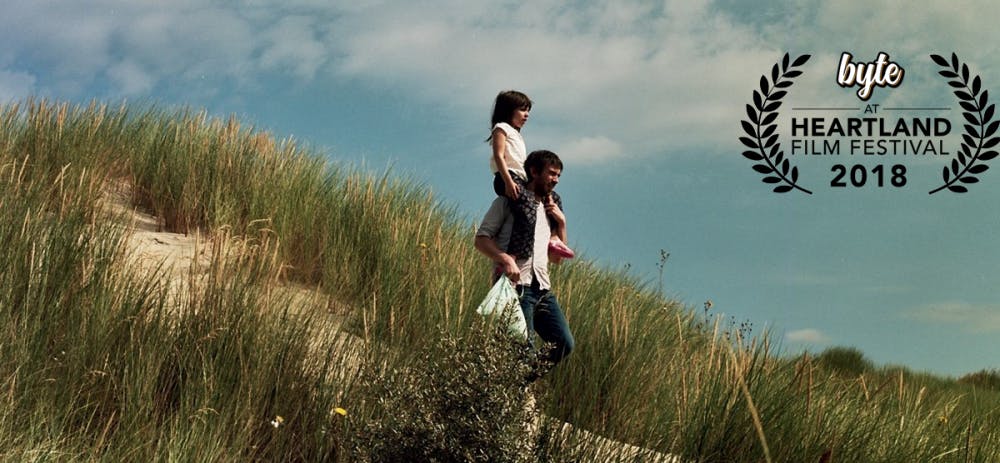by Tanner Kinney During the final day of this year’s Heartland Film Festival, every single finalist was shown to the public one last time, although all the winners were announced the day prior. Taking home the coveted grand prize for “Best Narrative Feature” was a foreign film titled The Elephant and the Butterfly. Going into this film as my final screening of the event, I had high hopes that it would surpass all other narratives I had seen prior. While it didn’t do that, there’s a clear reason why it won the grand prize. The Elephant and the Butterfly is a heartwarming story about family, achieving its purpose of being a feel-good film almost too well. The Elephant and the Butterfly follows a young man named Antoine, a chef of sorts who returns to visit an ex-lover and their child. The twist here being that the little girl, Elsa, has never met Antoine and doesn’t know of his existence. A twist of fate causes Elsa’s mother to ask Antoine to babysit, which turns into a whole series of events with Antoine finally getting to connect with his daughter. Together they play games, read stories, go to the beach, cook, paint, and all sorts of other activities. It’s not the most complex film or the most original concept, but its execution of these elements is near flawless. The two leads of Antoine (played by Thomas Blanchard) and Elsa (played by Lina Doillon) are both likeable, relatable, and even sympathetic at times. The chemistry between the two is absolutely fantastic, with the young child actress playing Elsa being particularly talented at the role. There are times when I wasn’t sure if the director just started rolling and told the two to improvise, because it was all so natural and realistic. Blanchard turns what could have been a potentially creepy character into a lovable father, but the star of the show is definitely Doillon’s Elsa. She’s just so gosh dang cute, even if she’s just filling the trope of the manic pixie dream daughter. It’s like when you babysit your own young family members; they do the dumbest things but you can’t help but smile. Well, you smile until they start playing with the knives. This great strength of the film is also what serves as the point that weakens the rest of the movie. It’s a nice feel-good movie, but that’s all it is. There are some points within the narrative that try to take a more dramatic turn (Antoine’s hatred of the stepfather, whatever is happening with the other babysitter, the business involving the restaurant Antoine is buying, the business involving Elsa’s crazy Grandma, etc.), but it all just never develops into anything. If one of those angles had been played out more within the film, the developing relationship between Antoine and Elsa would have been much more impactful. As it stands, the narrative just feels like it's missing that special something to truly ascend above the other narratives at Heartland. This is, of course, aside from one of the greatest scenes I think I’ve seen in any movie. In this scene, Antoine swipes his daughters scrapbook, rips out the picture of her and her stepfather, tears the stepfather specifically out of that image, neatly folds the bit of picture up, swallows it whole and downs it with a glass of some alcoholic beverage. That little bit of insanity was the best dramatic element in the whole film, but even that felt underdeveloped compared to the whole of the film. Another point of contention would have to be the filmmaking style. The film included a lot of shaky cam and more action oriented shots, even when it might not have been the best choice. It wasn’t bad enough that it turned on the motion sickness, sending me straight to the nearest trash bin (likely thanks to the fact I spent a lot of the film reading the subtitles), but the person I saw the film with noted that it made him uncomfortable. There also aren’t too many shots establishing locations and the passage of time. It’s hard to tell just how long Antoine and Elsa are together, which may have been an intentional choice, but it leads to the question of just how long Elsa’s parents were away. It’s one of those things that’s likely left intentionally vague, but it just became a nagging question in my mind. Despite those problems though, the real unsung hero of the film is the score. It’s very minimalistic, sticking to short piano features and limited instrumentation. It gives the film the whimsical touch it needs to accompany the adventures of Antoine and Elsa. The moments of the film where the two are just spending time together with no dialogue, just laughter and the score, are easily the best parts of the film. It’s like wrapping yourself up in a warm, comfortable blanket with a mug of hot cocoa. There’s not really anything to challenge you, it’s just a pleasant experience overall.




















